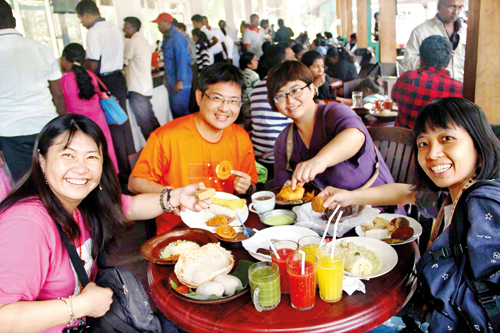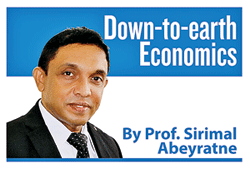Opinions and sentiments vs principles and facts
View(s):
There has been only a moderate increase in tourists.
I often used to tell my Economics classes that if we pose an economic question to anyone, they may all have an answer! It’s because Economics, though we study it as a subject, is an integral part of our life and lifestyles; therefore, anybody can have an answer. However, at least some of these answers are based on “opinions and sentiments” rather than principles and facts.
For more than a year now, I have been involved more in Sri Lanka’s crisis-related discussions and debates than anything else, while I have noted some of those in for our weekly column, “Down-to-earth Economics” too. It is quite interesting that from these discussions and debates, I have collected a list of economic ideas floating around us. I thought of putting forward just a few from my list and make a brief assessment in order to understand how good they are in solving Sri Lanka’s economic crisis.
Foreign exchange crisis
First and foremost, I must say that Sri Lanka’s economic crisis is fundamentally a “foreign exchange crisis” which we have nurtured on a fertile ground over a long period of time. Usually crises build up slowly, but the collapse is instant. And, the collapse requires triggering factors – policy factors or external shocks.
It’s because, after two rounds of policy reforms, first in 1977 and then in 1989, we have deviated from adopting reforms to build and strengthen the so-called “export-oriented” economy.
We have not only abandoned the policy reform process, but also carried out ad hoc and piecemeal policies and regulations and sometimes adopted policy reversals too. They strengthened an “anti-export bias” in the economy and directed it towards a “protected” domestic economy in which “non-tradable” sectors grew.
Of course, the economy grew from infrastructure development, construction, domestic transport, banking and insurance, telecommunication, real estate and public administration, and brought the country towards an “upper middle-income” level.
The problem was that the public investment based on “government borrowings” inflated the “non-tradable” sector expansion on the one hand, while these sectors didn’t generate much needed “exports” on the other hand. Then, the question was how to pay back foreign borrowings in US Dollars by earning Rupee incomes from non-tradable expansion.
IMF will rescue us
One of the opinion-based perceptions is that the anticipated IMF agreement will rescue the Sri Lankan economy from the current crisis. I would say that it will not, but it may help us!
 The IMF programme is aimed mainly at putting the house in order by improving government revenue, ensuring discipline in spending, introducing cost-recovery pricing for utilities, undertaking public enterprise reforms and, reducing corruption vulnerability.
The IMF programme is aimed mainly at putting the house in order by improving government revenue, ensuring discipline in spending, introducing cost-recovery pricing for utilities, undertaking public enterprise reforms and, reducing corruption vulnerability.
Of course, there is an economic link between the government budget and the foreign exchange problem – the so-called “twin deficit” problem: A persistent budget deficit would lead to a trade deficit too, while Sri Lanka is a classic case of this problem. But it does not mean at all that improving the government budget would improve export performance!
Moreover, the IMF programme will assist the country to improve its international credibility so that it would help us to secure assistance from international organisations and borrowings from others. Though it helps, it could be dangerous too, as we would be able to borrow again; and we have a past record too. As the IMF assistance came in 2009 and 2016, at both occasions it helped the country to borrow more!
Import controls, vital
Another opinion is centred around import controls, which in turn is believed to support domestic industries. Many would perceive that import controls are the key to get the economy out of the foreign exchange crisis. One important element underlying this opinion is that it recognises the foreign exchange shortage as the source of the problem but recommends policy direction worsening rather than solving it.
The question is that even if we cut down all imports, we would be saving about US$20 billion, at a time that Sri Lanka needs to look up to 100s of billions of dollars. Sri Lanka cannot control imports, because in the first place, 80 per cent of our imports are for sustaining production, including export production.
This means that if we restrict such imports, the crisis worsens due to falling exports.
The balance 20 per cent, though it is typically classified as “consumer goods”, a large part of it also goes as inputs to various businesses, including the tourism industry, while there are essential consumer items such as food, drink and medicines.
Although there can be restrictions on the importation of motor vehicles and electrical appliances, these restrictions cannot be continued with. And even if we continue them the country may be saving just about $5 billion, which may be enough to pay our foreign debt just for one year.
The second justification for import controls comes with the idea that it would provide “protection” to the domestic industry which would then grow and become a global business. This idea is only correct for a particular businessman or a firm, but not for a national economy.
If a business is protected from import competition, it would enjoy the domestic market where there are no competitors and where consumers have no choice other than buying from that particular business. The problem comes, when we think that it is the right policy for the country and try to implement it!
This policy resembles the point that we can make one person rich by giving him Rs.10 million; but if we make it a national policy to make our entire population rich by giving each one Rs.10 million, it would be disastrous!
Tourism revival
There is also an argument that when we can get our tourism industry back on track, we are safe. In order to support this opinion, we have also seen a moderate increase in tourist arrivals these days together with some relief of foreign exchange shortage. However, “no fuel queues” doesn’t mean at all that we are out of the danger!
The best performance in our tourism arrivals was in 2018, when there were 2.3 million arrivals generating $4.4 billion. This means that even if we record doubling of tourist arrivals in the near future, our foreign exchange earnings would be less than $10 billion! It would improve Sri Lanka’s foreign exchange situation, although it would not be a reliable source of stable foreign exchange earnings.
Vietnam is also an attractive tourist destination in Southeast Asia. Before the COVID-19 pandemic, Vietnam reported 18 million tourist arrivals in 2019, which almost totally collapsed during the pandemic. But Vietnam’s foreign exchange earnings did not collapse, which actually improved further during the pandemic due to strong export growth and foreign direct investment (FDI) inflows.
Vietnam’s export income increased to $264 – 336 billion during 2019 – 2021. During the same period, Vietnam also reported over $15 billion FDI inflows each year, contributing to the country’s future export growth. But when Sri Lanka earns about $10 – 12 billion exports revenue and less than $1 billion FDI, the loss of $4 – 5 billion tourist income and, $6 – 7 billion workers’ remittances can make a big impact on our foreign exchange earnings.
Beyond sentimental economics
Tourism is like the icing on the cake, while workers remittances is a sign of “hopelessness” than prosperity. Sri Lanka has to focus more on its export growth and, for that matter on winning the investor confidence, in order to get out of the crisis. It requires credible policies and reforms, not sentimental economics.
By the way, apart from opinions and sentiments, there are intellectually sound ideological arguments too; but if a politician or a policy-maker wants to ask the question, “then, what should we do now?” such arguments give no pragmatic answer. They are good for intellectual debates and philosophical research, but we would extract nothing out of them in order to make our lives better tomorrow.
(The writer is a Professor of Economics at the University of Colombo and can be reached at sirimal@econ.cmb.ac.lk and follow on Twitter @SirimalAshoka).
Hitad.lk has you covered with quality used or brand new cars for sale that are budget friendly yet reliable! Now is the time to sell your old ride for something more attractive to today's modern automotive market demands. Browse through our selection of affordable options now on Hitad.lk before deciding on what will work best for you!


